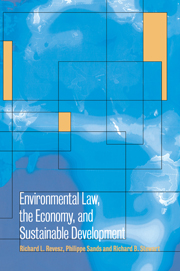 Environmental Law, the Economy and Sustainable Development
Environmental Law, the Economy and Sustainable Development Book contents
- Frontmatter
- Contents
- List of contributors
- Introduction: environmental regulation in multi-jurisdictional regimes
- PART I ENVIRONMENTAL REGULATION IN FEDERAL SYSTEMS
- PART II ENVIRONMENTAL REGULATION AND INTERNATIONAL TRADE
- PART III CHOICE OF ENVIRONMENTAL POLICY INSTRUMENTS
- 7 Economic incentives for environmental protection: opportunities and obstacles
- 8 Market-based incentives for environmental protection
- 9 Equity and efficiency in global emissions markets
- PART IV THE ENVIRONMENTAL STANDARD - SETTING PROCESS
- PART V INTERNATIONAL ENVIRONMENTAL LAW AND SUSTAINABLE DEVELOPMENT
- Index
9 - Equity and efficiency in global emissions markets
Published online by Cambridge University Press: 03 May 2010
- Frontmatter
- Contents
- List of contributors
- Introduction: environmental regulation in multi-jurisdictional regimes
- PART I ENVIRONMENTAL REGULATION IN FEDERAL SYSTEMS
- PART II ENVIRONMENTAL REGULATION AND INTERNATIONAL TRADE
- PART III CHOICE OF ENVIRONMENTAL POLICY INSTRUMENTS
- 7 Economic incentives for environmental protection: opportunities and obstacles
- 8 Market-based incentives for environmental protection
- 9 Equity and efficiency in global emissions markets
- PART IV THE ENVIRONMENTAL STANDARD - SETTING PROCESS
- PART V INTERNATIONAL ENVIRONMENTAL LAW AND SUSTAINABLE DEVELOPMENT
- Index
Summary
This essay examines the issues of equity and efficiency in the use of global environmental resources, with the atmosphere as a case in point. It shows a somewhat unexpected connection between the two issues in the context of international greenhouse gas emissions trading markets. Contrary to common wisdom, achieving a more even distribution of property rights to environmental assets is more than a matter of equity. Property rights also influence market efficiency. I show that a precondition for market efficiency is that more property rights in the global commons should be given to those regions that own fewer private goods. This connection leads to recommendations to implement the greenhouse gas emissions trading regimes authorized by the Kyoto Protocol to the United Nations Framework Convention on Climate Change (FCCC). In order to ensure an efficient trading market, developing countries should be allocated proportionately more emissions rights than industrial countries. In addition, there is a need to create an International Bank for Environmental Settlements (IBES) as a self-financing institution that can obtain market value from environmental resources while preserving them. Emissions trading, the global reinsurance of environmental risks, and securitization of the earth's biodiversity resources are financial instruments that merge the interests of the private financial markets with international sustainable development policy. These instruments and institutions should help to redefine economic progress in a way that is compatible with a harmonious use of the world's resources and with equity among rich and poor nations.
- Type
- Chapter
- Information
- Environmental Law, the Economy and Sustainable DevelopmentThe United States, the European Union and the International Community, pp. 263 - 280Publisher: Cambridge University PressPrint publication year: 2000
- 1
- Cited by
